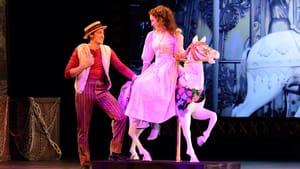Stay in the Loop
BSR publishes on a weekly schedule, with an email newsletter every Wednesday and Thursday morning. There’s no paywall, and subscribing is always free.
'Carousel' spins out
Media Theatre presents Rodgers and Hammerstein's 'Carousel'

You can tell something’s off right away. Media Theatre’s production of Carousel begins promisingly, as a combination of brass, woodwinds, and strings swell with the opening chords of the classic “Carousel Waltz.” And then . . . nothing happens.
A single, solitary painted horse sits center stage, frozen and unoccupied. Behind it, a giant screen blasts a barrage of grainy period photographs — automobiles, families picnicking, women in large hats and starched collars — that have no relevance to what should be unfolding before us. It’s not until the overture’s closing bars that Billy Bigelow (Joseph Spieldenner) and Julie Jordan (Maxwell Porterfield) finally appear, briefly mimicking the initial encounter that sets their devastating love story in motion.
A Carousel without a carousel?
This early blunder sets the tone for Jesse Cline’s maddeningly inconsistent interpretation of Rodgers and Hammerstein’s masterpiece. In many ways, Carousel broke the musical-theater mold when it premiered in 1945. Its songs, choral numbers, and extended dance sequences emanate organically from its book, creating a unified musical and dramatic whole. A successful staging must treat these elements as equal partners.
But Cline’s interest in building dramatic tension flags whenever the characters stop singing. He puts the performers in awkward tableaux, often facing in opposite directions when they’re meant to deliver heartfelt and meaningful dialogue to each other.
Projected images that mar the opening sequence — designed by Cline, Kyle Brylczyk, and Tim Haney — keep coming, the theatrical equivalent of establishing shots. Matthew Miller’s oddly industrial set does little to suggest a seaside village in Maine. And an overdose of theatrical haze obscures most of the famous Act Two Dream Ballet — though given what I could see of Dann Dunn’s sloppy choreography, that might actually be a blessing.
So close and yet so far
Cline comes from the American Idol school of staging musical numbers: put the singers as far downstage as possible and pump their voices directly out to the audience. For “If I Loved You,” one of the longest, most intricately paced duets in the canon, he frequently places Spieldenner and Porterfield on opposite sides of the stage, about as far away from each other as possible. They rarely look at each other, let alone suggest two people falling hopelessly, recklessly in love. But that hardly matters, since Carl Park’s blaring, arena rock–level sound design swallows up most of the words.
It’s a shame, because Porterfield possesses a sweet-toned, flutelike soprano that communicates Julie’s goodness, and Spieldenner’s warm but imposing baritone fits Billy’s near-operatic vocal lines. He also conveys the burgeoning humanity that lurks beneath the character’s gruff exterior. But his performance lacks a necessary element of danger.
Like many modern audience members, I find Billy’s casual violence toward his wife (and, later, his daughter) extremely jarring. Here, his hair-trigger brutality barely registers as threatening. That’s a problem — one that could be solved with stronger directorial vision.
The ensemble has several winning performances. Carl Smith makes for a scene-stealing Jigger Cragin; he captures the wily old salt’s humor and menace without going overboard. Elisa Matthews brings a golden voice to Nettie Fowler, although she could do more to impart the character’s unflappable sense of righteousness. Unfortunately, Madalyn St. John’s Carrie is hampered by an inconsistent accent. One moment she deploys a New England brogue thicker than an early-morning fog; a second later, she ignores the regionalisms written into the libretto (it’s “herrin’,” not herring). The program doesn’t list a dialect coach, and it shows.
Carousel contains moments that will always overcome poor directorial choices. During the finale, I found myself fighting back tears — as I always do — when Julie’s pure love and tender forgiveness finally earn Billy his place in heaven. Sadly, it was the production’s first and only genuine moment of transcendence. From beginning to end, Media’s Carousel can be chiefly characterized by what it lacks.
What, When, Where
Carousel. Adapted from Ferenc Molnár’s play Liliom. Music by Richard Rodgers, book and lyrics by Oscar Hammerstein II, Jesse Cline directed. Through October 22, 2017, at the Media Theatre, 104 E. State Street, Media, Pennsylvania. (610) 891-0100 or mediatheatre.org.
Sign up for our newsletter
All of the week's new articles, all in one place. Sign up for the free weekly BSR newsletters, and don't miss a conversation.

 Cameron Kelsall
Cameron Kelsall